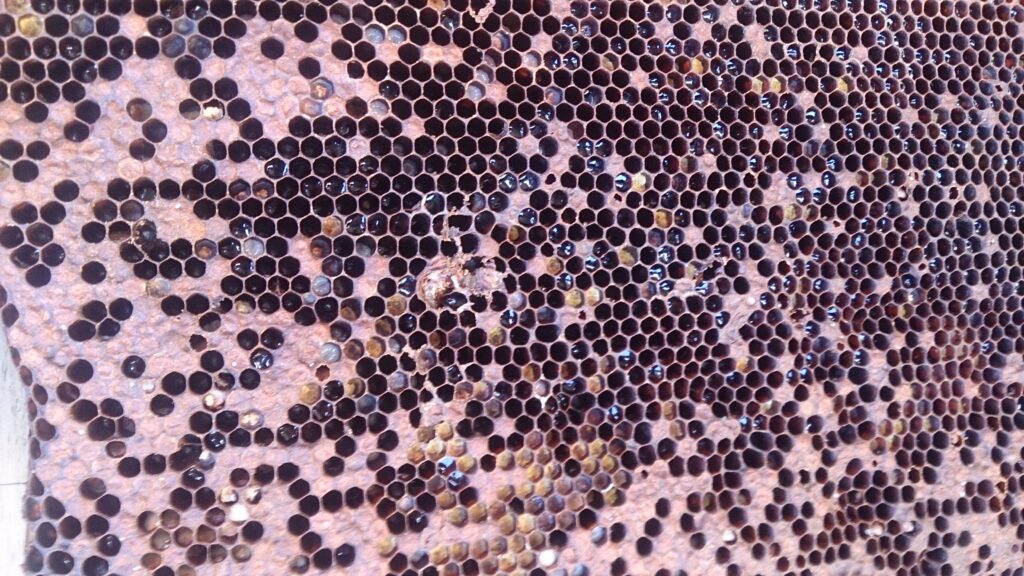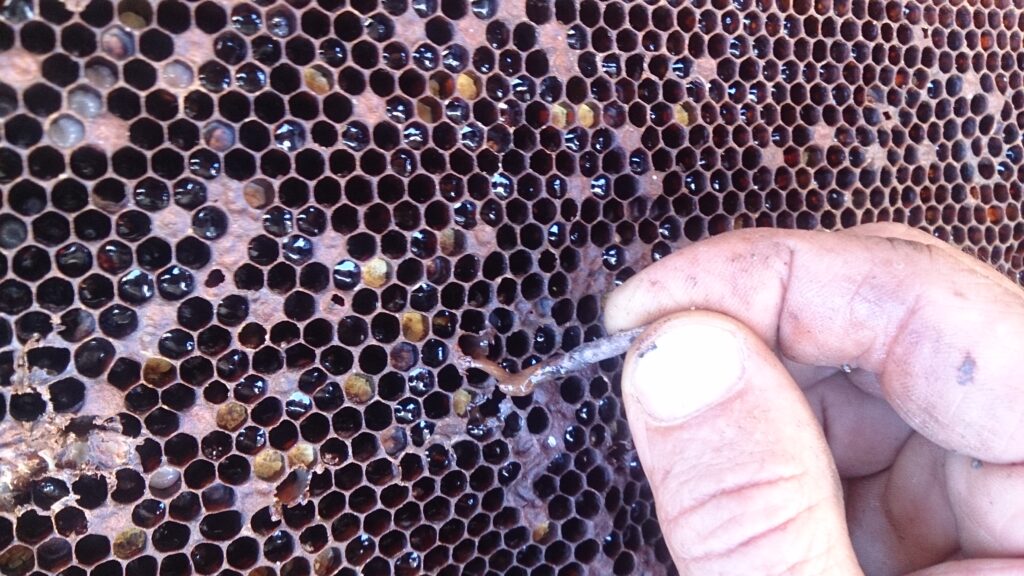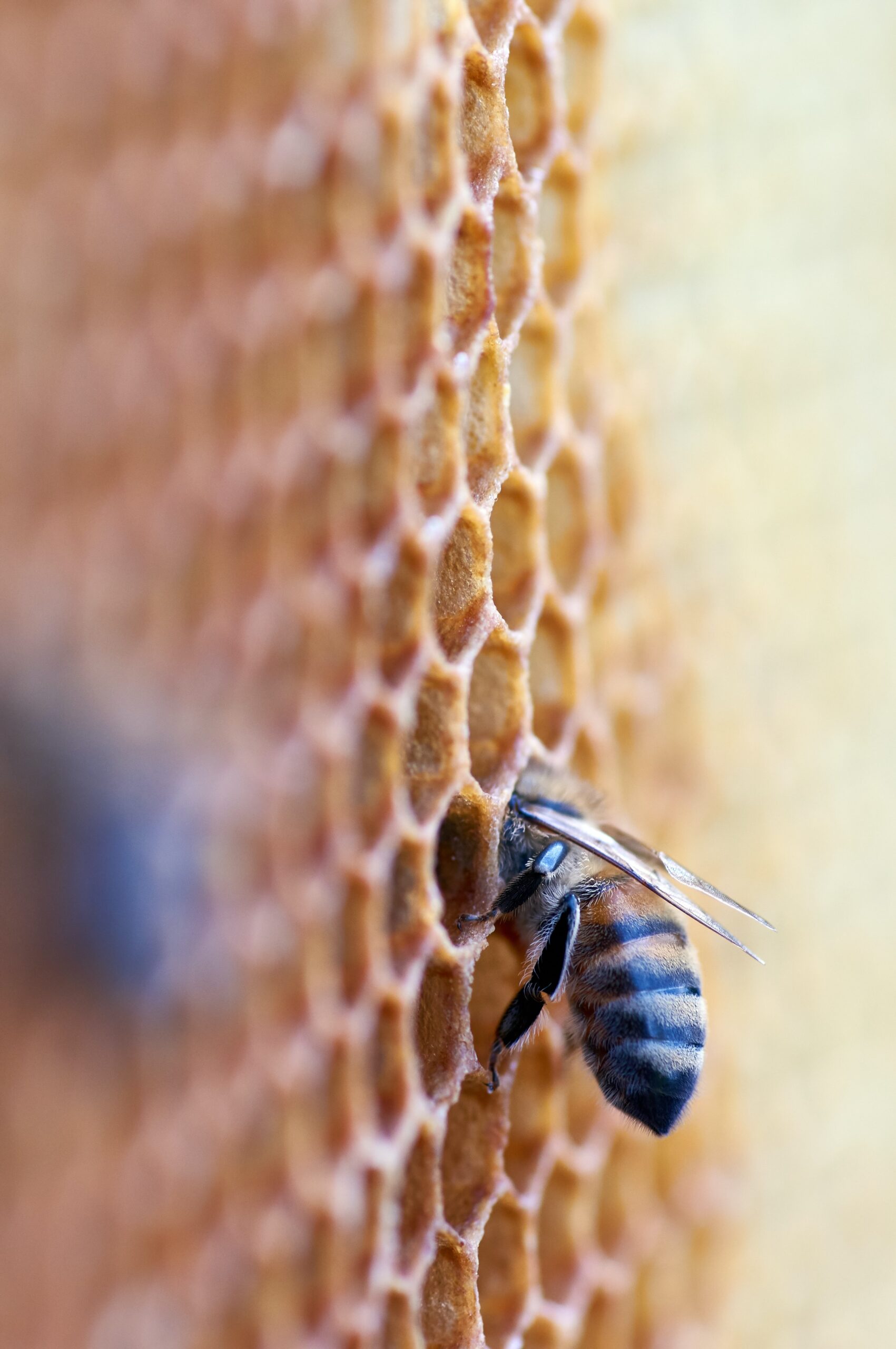The first vaccine for honeybees to prevent the fatal bacterial American foulbrood disease (AFB) has been conditionally approved by the United States Department of Agriculture (USDA).
This vaccine is the first for honeybees, which are essential to agriculture, and is regarded as a breakthrough in protecting honeybees.
This first licensure of a honey-bee product was conditionally issued to Diamond Animal Health, who collaborated with Dalan Animal Health to manufacture the vaccine. Dalan is a biotech company pioneering insect health.
How are bees infected?
AFB is a larval disease. The bacterium produces spores which contaminate larval food. Adult bees transmit the disease to uninfected larvae when feeding them, causing the bacterium to enter the larva’s digestive tract.

A hive contaminated with American foulbrood displays cells with dead larvae.
The highly contagious disease produces numerous spores, even though fewer than ten spores are sufficient to cause infection. The spores germinate in the larval midgut and multiply with the bacteria, until finally penetrating the intestinal epithelium, killing the larva.
The bacteria continue to grow and form spores in the dead larvae. The larval body turns brown and decomposes to a semi-fluid glue-like, sticky remain with a foul smell, which is the most characteristic clinical symptom.
The number of young bees drops drastically, which causes the colony to collapse.
Extremely high numbers of spores are produced in one individual, and as these are exceptionally environmentally stable, they remain infectious for more than 35 years. It is easily transmitted between colonies, apiaries and even countries.
How does the vaccine work?

American foulbrood causes the dead larvae to form a sticky, ropey consistency that smells foul.
The vaccine contains dead whole-cell Paenibacillus larvae bacteria, which are mixed into queen feed which the worker bees consume. The worker bees incorporate the vaccine into the royal jelly they produce and which they feed to the queen bee. Once the queen bee has consumed the vaccine-laden royal jelly, fragments of the vaccine are deposited in her ovaries. The queen’s larvae will be born with immunity to the disease.
Studies have shown that oral vaccination of honeybees may reduce larval death due to AFB. The vaccine is non-GMO and can be used in organic agriculture.
“Global population growth and changing climates will increase the importance of honey-bee pollination to secure our food supply,” said Dalan’s CEO, Annette Kleiser, in a statement. “We are ready to change how we care for insects, impacting food production on a global scale.”
Transgenerational immune priming
Dalan Animal Health, whose headquarters are in Athens at the University of Georgia’s Innovation Hub, uses a transgenerational immune priming approach, whereby the maternal animal passes immune modulators such as antigens and anti-microbial molecules to the next generation larvae before they hatch. The company intends to use this approach to develop vaccines for other honey-bee diseases.
AFB in Southern Africa
AFB was first detected in the Western Cape in December 2008 and was confirmed by laboratory tests in February of the following year. By 2015, an estimated 40% of the Western Cape bee population had been wiped out by the disease.
The primary treatment method for contaminated hives has been incinerating bees and infected hives, and antibiotic treatment. Regulations were introduced by the Department of Agriculture, Forestry and Fisheries (DAFF) to register hives and spell out procedures and management steps should clinical AFB symptoms be discovered in managed apiaries. It remains unclear how the disease found its way into the country.
“Chemical treatment has never been advocated in Southern Africa,” says John Moodie, a beekeeper from Honeywood Farm in the Southern Cape for more than five decades. “It has limited effectiveness and requires time and energy to apply to hives.”
He is cautiously optimistic about the vaccine and the role it could play in eliminating or at least controlling the occurrence of AFB, which continues to occur sporadically and remains a notifiable disease in the country.
Mike Allsopp, the leading scientist on bees in South Africa, agrees with John. “The published work was conducted under highly controlled conditions in University ‘bee yards’ in only a small number of hives and 30 larvae per hive were infected with spores. At best this is proof of the concept. The US Department of Agriculture has given a ‘conditional’ approval, which means the vaccine cannot be commercialised until the ‘approval conditions’ have been met. This is likely to be to gather data under field conditions; however, I cannot find the actual approval document which is normally public,” he says.
“One thing that did concern me is if you only get 30 to 50% efficacy then you still have a lot of larvae being infected and producing spores, so how do you eradicate the problem? Apparently, most hives have spores, even asymptomatic hives, and you need to get above a certain threshold of spores before you actually start seeing clinical symptoms of the disease. So, if you decrease rates of disease in a hive, the problem should sort itself out,” concludes Mike.
Future
The USDA’s conditional license has been issued for two years, during which Dalan will distribute it on a limited basis to commercial beekeepers. The vaccine is expected to be available for purchase in the United States in 2023. It is not clear when it will be available in South Africa.
For more information, contact John Moodie by sending an e-mail to john@honeywoodfarm.co.za.
References
Sottile, Z. (2023) The first-ever vaccine for honeybees has been approved by the USDA. CNN
https://edition.cnn.com/2023/01/07/us/honeybee-vaccine-usda-approval-scn-trnd
First-in-Class Honeybee Vaccine Receives Conditional License from the USDA Centre for Veterinary Biologics. (2023) Businesswire.
https://www.businesswire.com/news/home/20230104005262/en/First-in-Class-Honeybee-Vaccine-Receives-Conditional-License-from-the-USDA-Center-for-Veterinary-Biologics
Wossler, T.C. (2015) The American disease that is wreaking havoc on South Africa’s honeybee population Quartz
https://qz.com/africa/468994/the-american-disease-thats-wreaking-havoc-on-the-south-africas-honeybee-population









